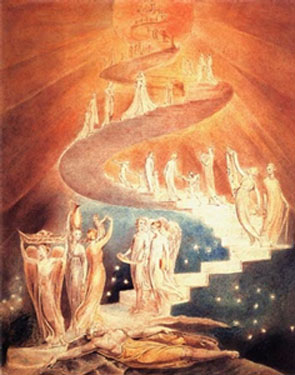This is semi-off topic, but semi-on topic; I hope this is ok to post. This was partly sparked by Meredith
telling me that you all previously worked on James and John, and me thinking how great it would be if there were an organized page on those posts, rather than having to page through the archives.
My question: I'm wondering whether anyone is interested in starting or working on some sort of Quaker wiki. I'm assuming everyone is somewhat familiar with
wikis.
Below I've written some things I think one could be used for. I actually have already gotten one set up
here on
a free wiki-hosting site; the question is whether it'd be best to use that one (currently it's pretty much empty of any content), or start a different one. I can give my take on the pros and cons if people are interested.
Possible uses it could have for this blog:· An easy way to collaboratively create a detailed catalog of/guide to our 400+ posts
· A way to perhaps collaboratively work on an entry before posting it — either altogether, or in spontaneously arranged groups (like "Hey Zach let's co-write an entry on logion 104"). This would probably be an efficient way to develop long, detailed posts if anyone had an inkling in that direction.
Possible uses for the Quaker blogosphere in general:· Other people could easily create similar catalogs of their posts.
· People involved in other communal blogs, like
the communal blog on early Quaker texts and history I'd like to start sometime, could in the same way develop entries collaboratively before posting.
· Recurring themes in different blogs could have pages on the wiki with links to the various blog postings, rather than people having to pore through various blog archives to find posts they feel are important. Like, there could be a page called
Plain dress which could include links to the many blog entries on that subject (and relieve Martin of the duty of having to keep up with them all by himself).
And (sorry to keep going on!) a few possible uses for Friends in general:· More detailed information about things that aren't encyclopedic enough to be in Wikipedia
· A ridiculously simple way for local, regional, (and even yearly) meetings to create and update home pages. Right now, most meetings either have no webpage, or ones that are hard to find and/or not very attractive. Example:
this page on my monthly meeting took about ten minutes to create, is easy for anyone in my meeting to update, and couldn't exist on Wikipedia.
(Hopefully you can see that although Wikipedia, the biggest wiki, is an encyclopedia, not all wikis have to be in that genre. For example, there is an
Orthodox Christian wiki, which I think is a great idea, but I think they may be limiting themselves by being a wiki-
encyclopedia on Orthodoxy, rather than a multi-purpose wiki for and about Orthodox Christianity. So I'm not just proposing a Quaker encyclopedia wiki, but a wiki that could be used for a huge number of Quaker related things, encyclopedic and not.)
What do you think?




